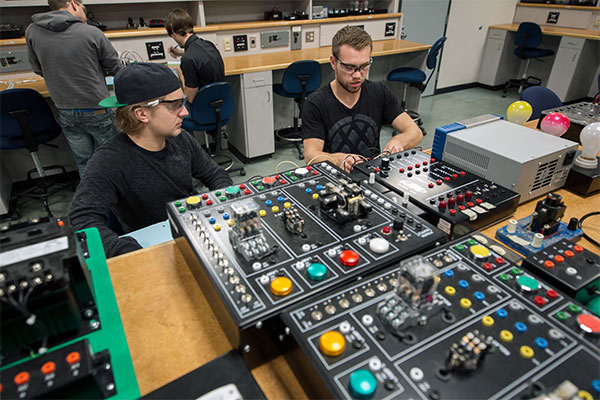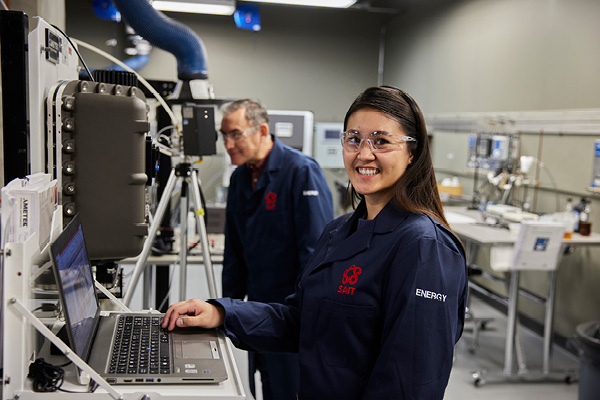On this page:
Overview
The Electrical Engineering Technology program will equip you with a diverse skill set in the dynamic field of electrical engineering.
This robust program is your conduit to a future in both renewable and conventional energy. It lays a foundation for lifelong learning, allowing you to keep pace with rapidly evolving electrical engineering technologies.
You will:
- gain a deep understanding of electricity and power generation, transmission and distribution systems, including the integration of renewable energy sources
- learn the principles of electrical circuit design and apply them to create efficient, safe and reliable electrical systems
- master the technologies and electronics that automate processes and control systems, which are essential for modern industrial operations
- get hands-on experience in labs that simulate real-world electrical engineering challenges
- develop project management skills specific to electrical engineering projects, including planning, execution and quality control
- become well-versed in industry standards and codes, including national and international electrical codes and standards, to ensure compliance in all aspects of your work.
Prepare for the workforce with professional skills training, including communication, teamwork and problem-solving. Connect with industry professionals through internships, co-op placements and industry-sponsored projects.
Explore electrical engineering career opportunities across various sectors, such as utility companies, electrical equipment manufacturers and industrial automation firms.
This program is designed for those who envision a career where they can contribute to the efficient use of energy, support the development of smart grids, and innovate within electrical design and automation sectors.
As a graduate, you will be prepared to step into construction, operation and infrastructure maintenance roles. With additional education and experience, you can move into manager, inspector or power system electrician roles.
Flexible learning options
This program may be taken in a blended delivery format to allow you the flexibility to work while studying.
This option is available beginning in July (summer semester) each year and spans three years. Classes in this cohort are held online in the evenings and on weekends.
Journeyperson electricians may be eligible for course credit and can begin classes in September (fall semester.)
Those who work in electrical engineering tend to be objective, innovative and methodical.
You need:
- the ability to adapt to change and adopt new ideas
- an aptitude in math and science, particularly physics
- the ability to study and interpret plans and diagrams, solve problems with circuits, and test materials and products
- leadership skills and the ability to work well with others as part of a team
- speaking and writing skills.
In some positions, good colour vision is important.
You should enjoy working with tools, computers, instruments and machinery, being precise and methodical in your work, and finding creative solutions to problems.
Journeyperson electricians and those with related work experience or post-secondary education may be eligible to receive some advance credit for courses in this program.
There may also be opportunities to further your education once you graduate.
Learn more about program and institution transfer options.
As part of your final capstone project, you’ll work in groups to apply what you’ve learned to address an industry-related technical problem.
Your team’s work will be supervised by an instructor and industry mentor. Each team will showcase their work at an event open to faculty, other students and invited industry professionals.
This program is nationally accredited by Technology Accreditation Canada (TAC) and the Canadian Council of Technicians and Technologists at the technologist level.
Graduates are eligible for membership in the Association of Science and Engineering Technology Professionals of Alberta (ASET.)
After successfully completing this program, you’ll receive a SAIT Electrical Engineering Technology diploma.
Careers and opportunities
Each year, SAIT conducts a survey between February and April to determine the employment rate, salary and satisfaction of our newest SAIT alumni.
![]() 86% graduate employment rate
86% graduate employment rate
![]() $80,000 average starting salary
$80,000 average starting salary
Find out more about our graduate employment statistics >
Our graduates may work in the following occupations. Some careers require additional experience and education.
Associated National Occupational Classification (NOC) codes: 22310, 21310, 20010, 72202, 92100, 72011.

Career counselling and support
Unsure which career path is for you? SAIT offers career planning services to help you decide your future.
You can also get started by taking our online career finder quiz, which can help you narrow down your search based on your current skills and interests.
Finally, you can also head to Alberta alis for various tools and resources, including additional quizzes and labour market information to help you narrow down a career path.
Services and workshopsCourses
The Electrical Engineering Technology diploma requires 67.5 credits (25 courses) to complete.
You can study full-time during the day and complete the program over two years, with two semesters each year.
Or, you can study evenings and weekends as part of a blended stream and complete the program over three years, with eight semesters. Fewer courses are scheduled each semester. Some take place online, while others occur on campus.
| Course | Credits |
|---|---|
|
This course provides the student with the necessary information and resources required for developing a PLC Project using basic instructions. Topics covered are: PLC family, hardware components, programming software, project organization, Timer and Counters, DFB’s, Math Instructions, Data Comparison Instructions, Sequential Function Chart, Process Loop Control, Analog Input, and Analog Output. Communication via Ethernet is also covered. Students will design, connect, program, and troubleshoot the operations of practical industrial control applications. Pre-requisites:
Equivalents:
|
3 |
|
This course provides the student with the necessary information and resources required to set up remote I/O & communication networks for the Allen-Bradley Contrologix system. In addition, the student is introduced to process control using the PID instruction. Topics covered are: Remote I/O configuration and architecture, DH+ networks, ControlNet networks, Ethernet networks, DeviceNet, RSNetworks Software, Process control theory, and PID instruction programming and tuning. This course also provides the student with the required resources to set up and create a graphic program for the Allen Bradley PanelView Plus Operator Interface Terminal using Rockwell FactoryTalk View Studio software. Topics covered are: PanelView Plus Hardware, Communications, and creating an application with Factory Talk Studio software. Pre-requisites:
|
3 |
|
This course is designed to develop technical writing and presentation skills to ensure workplace readiness. Students will learn how to evaluate communication situations, analyze documents, assess research sources and develop organizational skills to apply in their work. They will learn about and practice designing, formatting and writing a range of professional documents. Students will also develop confidence (through practice) in the development and delivery of effective and engaging presentations. |
3 |
|
The focus of this course is a team project report. The process approach involves students in all aspects of the management of communications tasks, both oral and written. The final products are a formal report and an oral presentation of the content. Pre-requisites:
|
3 |
|
This applied computer course provides students with critical electronic communications, data and file management skills, along with a strong focus on using common productivity applications to format, calculate, analyze, visualize, and present or report data and information. Industry standard project management principles are implemented throughout the course from a digital perspective, so students can have an appreciation for how computing skills relate to real world business processes. |
3 |
|
The designing of buildings and facilities is a requirement of most construction projects. This first level design course provides theoretical and practical electrical design concepts for commercial facilities, lighting and motor control applications. The concepts of facility electrical design are explored in the context of the current Canadian Electrical Code and enhanced using AutoCAD software as a drafting and design aid. State-of-practice design techniques are analyzed and applied. Completion of a major project incorporates analysis, calculation and design competencies. Pre-requisites:
|
3 |
|
This advanced course applies electrical design techniques to industrial applications including cable tray design, fire alarm and detection, equipment bonding and system grounding, power factor correction, heat tracing, artificial grounding, hazardous locations and motor control. The concepts of industrial facility design are explored in the context of the Canadian Electrical Code. Industry applied software is used to assist the student in completing a hazardous location project, including engineering drawings. Pre-requisites:
|
3 |
|
Introduction to networks and data communications, description of data and signals, media - wired and wireless, connectivity devices, multiplexing, error correction and detection, network architectures - LAN, WAN, inter-networks, the operations and protocols of the Internet - TCP/IP, network security, HMI software, exposure to DNP and ModBus protocols found in the power industry. |
1.5 |
|
Introductory concepts dealing with the principles of series, parallel and series parallel control circuits are verified. Push buttons, relays and timers will be used to achieve sequential and combinational control circuits. Motor starters and control circuits with devices such as limit switches, zero-speed switches and indicating lights are studied. In this course student performs experiments to illustrate principles developed in the theory course and continues to develop the hands-on skills required of an Electrical Engineering Technologist. Pre-requisites:
|
3 |
|
The study of alternating current theory as applied to single-phase and three-phase circuits. Circuit analysis and network theorems are applied to theoretical and practical AC circuits. Full analysis of three phase Wye and Delta circuit configurations; watt meter power measurement methods and power factor correction. Pre-requisites:
Corequsites:
|
3 |
|
This is an introductory course into electric power generation and system operation. It will provide students with an overview of the processes, technologies, economics and environmental issues associated with electricity production from conventional and renewable energy sources; the role of the system operator in the planning and coordinated operation of the bulk supply system, as well as an overview of the Alberta wholesale and retail energy markets. Pre-requisites:
|
1.5 |
|
The course is an application of theory to the operation, control and performance characteristics of single-phase and three-phase transformers, three-phase synchronous machines, three-phase induction motors, variable speed drives, and DC Machines. Pre-requisites:
Corequsites:
|
3 |
|
A study of the theory of operation, control, performance, and characteristics of induction motors and their associated starting methods, synchronous motors, generators, variable speed drives and DC machines. Pre-requisites:
Corequsites:
|
3 |
|
A study of the construction and of the theory of operation, performance, and characteristics of single-phase and three-phase transformers and their applications. Pre-requisites:
Corequsites:
|
3 |
|
This course is a study of the operation and analyses of large interconnected power systems. Major topics include: System and Generation Operation and Response to Power Flow Change, Electric Power Transmission, System Modeling and Power (Load) Flow Studies, Fault Analyses, and Power System Stability Pre-requisites:
Corequsites:
|
3 |
|
This course is a study of the protection and control of utility and industrial power systems. Major topics include power system equipment and performance characteristics, print reading, revenue metering, calculation of short circuit currents, application and coordination of protective devices, and testing of protective relays. The student will make use of computer programs, test sets, and relays as used in the industry. Pre-requisites:
Corequsites:
|
3 |
|
An introductory course in electrical principles, concepts and relationships; power and energy; circuit analysis; capacitance; magnetism and inductance; stead-state and transient response. AC circuit analysis is introduced. The labs supplement the theory by using lab connections and computer simulations to illustrate operational and analytical concepts. |
3 |
|
Digital and Electronic Circuits examines the operating principles of digital circuits, relay ladder logic and electronic circuits. Topics include: numbering system, binary logic gates, conversion between Boolean equations and logic circuits, relay ladder logic, Flip Flops, diode, transistor and Operational Amplifiers. |
3 |
|
This course is an introductory course in Power Electronics devices and applications. The course covers the use of devices such as BJT, SCRs, TRIACs and other semiconductor devices and their applications in power supplies, switching circuits, controlled rectification, motor control applications, adjustable frequency drives, inverters and UPSs. The course provides basic knowledge of circuitry for the control and conversion of electrical power with high efficiency to achieve regulation of voltage, current, or power; dc-dc converters, ac-dc rectifiers, dc-ac inverters. The theory will be supported with a hands-on lab environment. Pre-requisites:
|
3 |
|
Electrical Diagrams and AutoCAD provides hands-on, practical experience in design and drawing by employing computer-aided drafting and design (CADD) principles and software, specifically with AutoCAD software. You will acquire valuable skills by producing two-dimensional (2D) drawings that make use of drawing theory and geometric construction. To achieve your goals, you will apply basic drawing commands, manipulate tools and organize the display of drawing elements by using interface commands, settings, editing, measurement, display control, grids, text, layers and hatch techniques. You will use these CADD skills in drawing electrical diagrams. Equivalents:
|
1.5 |
|
Provides an introduction to safety hazards and safe practices in industry with an emphasis on safe electrical practices. The student becomes conversant with the OHS Act and WHMIS. |
1.5 |
|
$item.getChild('courseDescription').textValue
|
3 |
|
Calculus for Technologists, a continuation of the Mathematics for Technologists, provides learners with required skills for calculus. Following an introduction to continuity and limits of functions, topics will include general rules of differentiation and of integration for algebraic and transcendental functions as well as topics in infinite series. The general rules studied will be applied to solve application problems. Pre-requisites:
|
3 |
|
Learners will be introduced to the fundamentals of project management and its application in industry. The focus of this course is to provide project management skills including planning and management of project scope, time, cost, quality, human resources, communication, risk and procurement. Emphasis is on team building and group work. Pre-requisites:
Concurrent Prerequisites:
Equivalents:
|
1.5 |
|
EET Capstone Project Course provides students with the opportunity to work in groups to apply and integrate the knowledge gained in the EET program through an industry related technical project. The course serves as a platform linking academic studies with industrial applications. The work is carried out under the supervision of a faculty member and industry mentor (optional). Students are required to demonstrate academic ability, team work, project management skills, communication skills, technical skills, social skills, methods of applied research, ethics and professionalism. Each team will showcase the final outcome of the project in an exposition set-up to be attended by general public, faculty, other students and invited industry professionals. Pre-requisites:
Equivalents:
|
3 |
Progression
Students must attain a PGPA and/or a CGPA of 2.0 or better in each semester and pass the necessary prerequisite courses to progress through the program. To qualify for graduation, students must pass all courses, attain a CGPA of 2.0 or better and complete course requirements within the prescribed timelines.
Review our grading and progression procedure >

Explore your options!
Some courses in this program are available through Open Studies. You can complete courses via Open Studies to get a head start on your education, reduce your course load once accepted into a credentialed program, or determine which career path best suits you before you fully commit.
You may also take courses for general interest or personal and professional development.
Available Open Studies coursesAdmission requirements
Applicants educated in Canada
All applicants must demonstrate English language proficiency and meet the following requirements or equivalents.
- at least 60% in Math 30-1 or at least 75% in Math 30-2, AND,
- at least 60% in English Language Arts 30-1 or 75% in English Language Arts 30-2, AND,
- at least 60% in Physics 20
SAIT accepts high school course equivalents for admission for applicants educated outside Alberta.
All applicants who were educated outside of Canada must demonstrate English Language proficiency and provide proof they meet the program admission requirements with an international document assessment. Find out what educational documents are accepted and assessment options.
SAIT may also accept courses completed at certain international post-secondary institutions.

Academic Upgrading
Missing an admission requirement for this program? Upgrade your prior education to help you receive admission into one of SAIT's career programs.
Upgrade
English language proficiency
All applicants must demonstrate English language proficiency prior to admission, including students educated in Canada.
Learn moreAvailable intakes
Spring 2024
Start dates:
- Domestic students: Waitlisted
-
-
Application deadline: Feb. 23, 2024
-
- International students: Closed
-
-
Application deadline: Jan. 22, 2024
-
Fall 2024
Start dates:
- Domestic students: Waitlisted
-
-
Application deadline: June 28, 2024
-
- International students: Closed
-
-
Application deadline: May 29, 2024
-
Winter 2025
Start dates:
- Domestic students: Open
-
-
Application deadline: Oct. 25, 2024
-
- International students: Open
-
-
Application deadline: Sept. 30, 2024
-
Costs
2024/25 tuition and fees
The following costs are effective as of July 1, 2024.
Domestic students
Books and supplies are approximately $1,000 for the first year and $500 for the year.
This is a bring-your-own-device program with a standard computer hardware and software requirement. See the specific requirements on our computers and laptops page.
Find your booklist on the SAIT Bookstore's website. The booklist will be available closer to the program start date. Can’t find your program or course? The bookstore didn't receive a textbook list. Contact your program directly to determine if they’re still refining course details or if you're in luck; no textbook purchase is required this term.
Required personal protective equipment (PPE)
PPE is required in various labs. You'll need CSA-approved (green triangle) protective footwear and CSA Z94.3 (class 1) safety glasses with side shields.
The industry-approved PPE you'll need will be discussed during your first few days of classes.
2023/24 tuition and fees
The following costs are effective until June 30, 2024.
Domestic students

Financial aid
Paying for your education may feel overwhelming, but we have resources and programs that can help, including information about payment options, student loans, grants and scholarships.
Learn moreApplication process
Ready to apply?
Follow our step-by-step guide to submitting a successful application.
Communication during admission
Email is the primary source of communication during the selection process. Ensure your personal email account is managed appropriately to receive our emails, files and communications. We recommend you add the macphail.students@sait.ca domain to your safe senders' list or you risk missing critical email messages.

Begin your application
Apply now using the online application portal.
Ensure you have a valid Visa or Mastercard to pay the non-refundable application fee of $120 for domestic applicants or $150 for international applicants.
Apply nowInformation sessions
Prepare for a strong start in your chosen program or get the details you need to decide your future path.
Our expert staff and faculty are ready to answer your questions and provide information about the following:
- What sets SAIT apart
- An introduction to the program and area of study
- Admission requirements
- Future career paths
- Information on the earning potential and graduate employment rates.
Contact us
MacPhail School of Energy
-
Phone - 403.284.8451
International Student Advising
-
Phone - 403.284.8852
-
Email - international@sait.ca
Subscribe for updates
Your journey starts here! Sign up to get important updates on:
- Energy and environment programs
- Application information
- Relevant news and events




